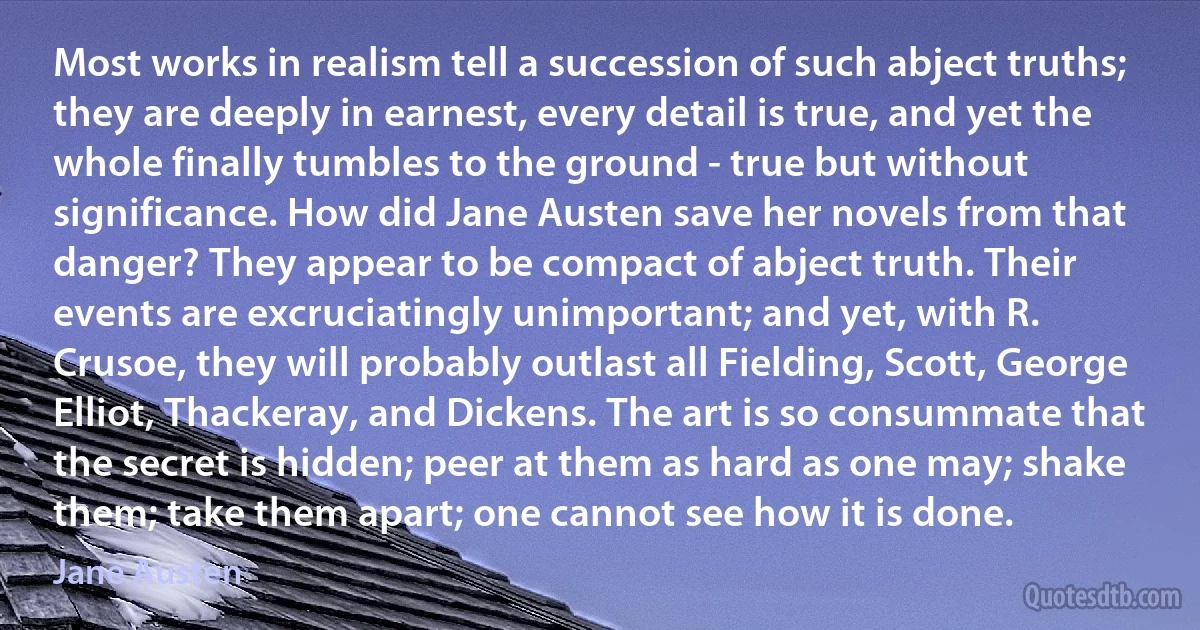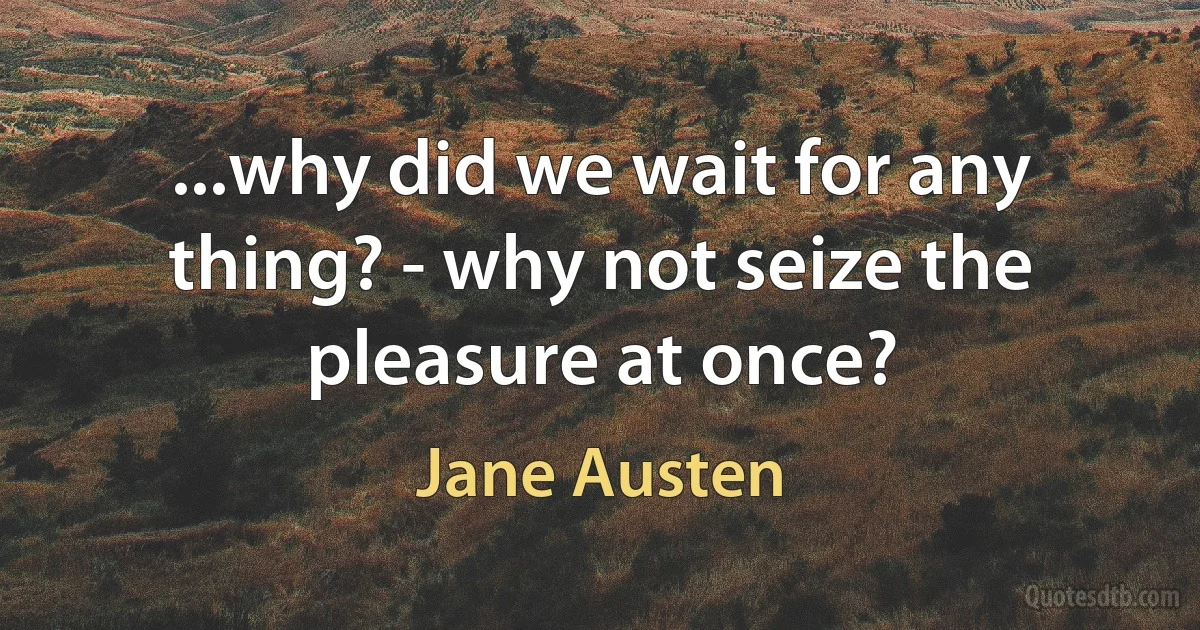Jane Austen quotes - page 21
Jane Austen was an English novelist most famous for works such as "Pride and Prejudice" and "Sense and Sensibility." Her novels explore themes of love, marriage, and social status in the British landed gentry. She continues to influence literature and is celebrated for her wit and keen observations of society. Here are 599 of her quotes:
When I was young, it was not thought proper for young ladies to study very conspicuously; and especially with pen in hand. Young ladies (at least in provincial towns) were expected to sit down in the parlour to sew,-during which reading aloud was permitted,-or to practice their music; but so as to be fit to receive callers, without any signs of blue‐stockingism which could be reported abroad. Jane Austen herself, the Queen of novelists, the immortal creator of Anne Elliott, Mr. Knightly, and a score or two more of unrivalled intimate friends of the whole public, was compelled by the feelings of her family to cover up her manuscripts with a large piece of muslin work, kept on the table for the purpose, whenever any genteel people came in. So it was with other young ladies, for some time after Jane Austen was in her grave; and thus my first studies in philosophy were carried on with great care and reserve.

Jane Austen
Which brings us again, after this long way about, to Jane Austen and her novels, and that troublesome question about them. She was great and they were beautiful, because she and they were honest, and dealt with nature nearly a hundred years ago as realism deals with it to-day. Realism is nothing more and nothing less than the truthful treatment of material, and Jane Austen was the first and the last of the English novelists to treat material with entire truthfulness. Because she did this, she remains the most artistic of the English novelists, and alone worthy to be matched with the great Scandinavian and Slavic and Latin artists.

Jane Austen
Why do the characters in Jane Austen give us a slightly new pleasure each time they come in, as opposed to the merely repetitive pleasure that is caused by a character in Dickens? Why do they combine so well in a conversation, and draw one another out, without seeming to do so, and never perform? The answer to this question can be put in several ways; that, unlike Dickens, she was a real artist, that she never stooped to caricature, etc. But the best reply is that her characters, though smaller than his, are more highly organized. They function all round, and even if her plot made greater demands on them than it does, they would still be adequate.

Jane Austen
Jane Austen was born before those bonds which (we are told) protected women from truth, were burst by the Brontës or elaborately untied by George Eliot. Yet the fact remains that Jane Austen knew more about men than either of them. Jane Austen may have been protected from truth: but it was precious little of truth that was protected from her.

Jane Austen
Why do you like Miss Austen so very much? I am puzzled on that point ... I read that sentence of yours, and then I got the book. And what did I find? An accurate daguerreotyped portrait of a commonplace (everyday) face; carefully fenced, highly cultivated garden, with neat borders and delicate flowers; but no glance of bright vivid physiognomy, no open country, no fresh air, no blue hill, no bonny beck. I should hardly like to live with her ladies and gentlemen, in their elegant but confined houses.

Jane Austen
I have been reading Miss Austen's Emma, which I had entirely forgotten, with the greatest enjoyment. I think it an admirable book, & I dare say you will agree with me. Miss Austen is an inimitable painter of quiet life. It would be difficult to say where the interest of Emma lies, yet it does interest strongly. There is no fine writing; no laboured description; no imaginative or ideal touches; no working on the feelings. Its magic must be its truth. It is exquisitely true. Life is presented to us, not as it may be taken in rare situations, in picturesque emergencies, but as we see it everyday. Common, workday life, with here & there a suit of best for Sundays. Yet there is nothing trivial. It is what Alfred calls in one of his unfinished poems "most ideal unideal, most uncommon commonplace."

Jane Austen
There are few people whom I really love, and still fewer of whom I think well. The more I see of the world, the more am I dissatisfied with it; and every day confirms my belief of the inconsistency of all human characters, and of the little dependence that can be placed on the appearance of merit or sense.

Jane Austen
I have frequently detected myself in such kind of mistakes... in a total misapprehension of character at some point or other: fancying people so much more gay or grave, or ingenious or stupid than they really are, and I can hardly tell why, or in what the deception originated. Sometimes one is guided by what other people say of them, without giving oneself time to deliberate and judge.

Jane Austen
Jane Austen
 Occupation: British Writer
Occupation: British Writer
Born: December 16, 1775
Died: July 18, 1817
Quotes count: 599
Wikipedia: Jane Austen












